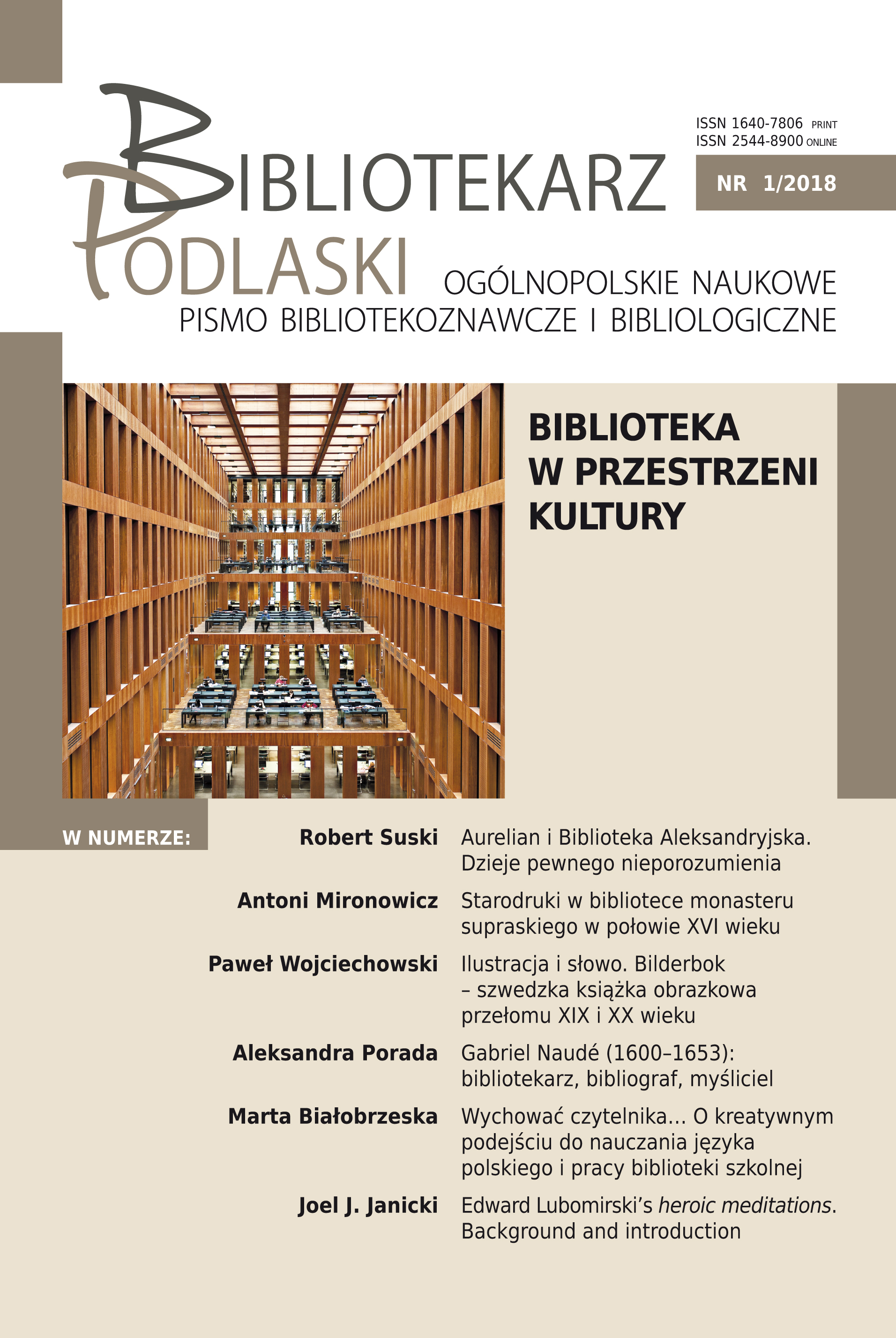Abstract
The article describes the phenomenon of fluid modernity and an increased speed of digitalisation of the world in the context of local libraries and their operations. The author, being a supporter and enthusiast of facilitating access to digitalised contents from the whole world asks about the consequences of the changes introduced, including those less optimistic ones. Among dangers he reflects on is the drop in the library’s interest in the quality of the process of reading, the quality of using a book. Referring to the Pierre Nora’s term of “places of memory”, the scholar wonders whether perfecting the channels connecting the reader with the content that omit (invalidate) the role of the surroundings and the context of this contact, will not have negative consequences. The article is essayistic in nature, its goal is to articulate selected issue concerning the operation of a regional library, worthy of thorough analysis and reflections.
References
Bauman Z., Płynna nowoczesność, tłum. T. Kunz, Wydawnictwo Literackie, Kraków 2006.
Bednarska-Ruszajowa K., Biblioteki w literaturze polskiej, Wydawnictwo Uniwersytetu Jagiellońskiego, Kraków 2006.
Castells M., Społeczeństwo sieci, tłum. M. Marody, Wydawnictwo Naukowe PWN, Warszawa 2007.
Charles W. Bailey J., Google Books Bibliography, 15.08.2011, http://www.digital-scholarship.org/gbsb/, [dostęp: 2.03.2018].
Dziadek A., Projekt krytyki somatycznej, Instytut Badań Literackich, Warszawa 2014.
Frankl V.E., Człowiek w poszukiwaniu sensu, tłum. A. Wolnicka, Wydawnictwo Czarna Owca, Warszawa 2017, Wydanie 1. zmienione.
Friedman T.L., Świat jest płaski: krótka historia XXI wieku, tłum. T. Hornowski, Dom Wydawniczy Rebis, Poznań 2009, 2. wyd.
Golębiewski Ł., i Dąbrowski M., Książka w dobie internetu – z Łukaszem Gołębiewskim rozmawia Marcin Dąbrowski, „e-mentor” 2012, t.5, s. 4–7.
Gołębiewski Ł., Gdzie jest czytelnik?, Biblioteka Analiz, Warszawa 2012.
Grochowski G., (Nie)widzialne miasta, „Teksty Drugie” 2008, nr 4, s. 6–10.
Jazdon A., Biblioteka mojego wieku – czyli jaka?, „Biblioteka” 2007, nr 11(20), s. 1–22.
Keen A., Kult amatora: jak internet niszczy kulturę, tłum. M. Bernatowicz i K. TopolskaGhariani, Wydawnictwa Akademickie i Profesjonalne, Warszawa 2007.
Lauersen C.U., Dlaczego przychodzą? Biblioteka jako miejsce i marka, tłum. A. Wolańska, „Biuletyn EBIB”, b.d., nr 7(177).
Leontiev D., i Osin E., Utrata sensu życia i wyobcowanie, tłum. A. Kondrat, „Studia z Historii Filozofii” 2017, t.8, nr 4, s. 35–56.
Łempicki Z., Świat książek i świat rzeczywisty. Przyczynek do ujęcia istoty romantyzmu, [w:] Renesans, Oświecenie, Romantyzm i inne studia z historii kultury, tłum. O. Dobijanka, PWN, Warszawa 1966, s. 329–368.
Markowski M.P., Życie na miarę literatury. Eseje, Wydawnictwo Homini SC, Kraków 2009.
Miłosz C., Niemoralność sztuki, [w:] Życie na wyspach, tłum. J. Gromek, Znak, Kraków 1998, s. 9–20.
Nora P., Mémoire collective, „La nouvelle histoire” 1978, s. 398–401.
Osiński D.M., Ciało w bibliotece, [w:] Bibliotheca mundi. Studia bibliologiczne ofiarowane Janowi Leończukowi, red. J. Ławski i Ł. Zabielski, Książnica Podlaska im. Ł. Górnickiego, Białystok 2016, s. 399–474.
Prensky M., Digital natives, digital immigrants, „On the horizon” 2001, t.9, nr 5, s. 1–6.
Rybicka E., Geopoetyka: przestrzeń i miejsce we współczesnych teoriach i praktykach literackich, Universitas, Kraków 2014, Horyzonty Nowoczesności 109.
Shusterman R., Świadomość ciała: dociekania z zakresu somaestetyki, red. K. Wilkoszewska, tłum. S. Stankiewicz i W. Małecki, Wydawnictwo Universitas, Kraków 2016.
Siewicz K., Otwarty dostęp do publikacji naukowych. Kwestie prawne, Warszawa 2012, https://repin.pjwstk.edu.pl/files/Otwarty_dostep_do_publikacji_naukowych.pdf.
Skotnicka M., My, dzieci sieci: wokół manifestu, Fundacja Nowoczesna Polska, Warszawa 2012.
Szpociński A., Miejsca pamięci (lieux de mémoire), „Teksty Drugie” 2008, nr 4, s. 11–20.
Wojciechowski J., Biblioteka w komunikacji publicznej, Stowarzyszenie Bibliotekarzy Polskich, Warszawa 2010.
Wróbel W., Kilińskiego: historia jednej ulicy, Międzynarodowe Stowarzyszenie Białostoczan, Białystok 2016.
Google Books, b.d., https://books.google.com/intl/pl/googlebooks/history.html, 2.03.2018.
Nasza misja – Koalicja Otwartej Edukacji, b.d., http://koed.org.pl/pl/nasza-misja/.
Articles published in the “gold open access” mode on the basis of a non-exclusive license agreement between the publisher and the author. Permitted use:
- the publication may be read and stored on any device,
- the publication may be cited (with obligatory reference to the author, the title of the text, as well as the full title, bibliographic address of the issue and page of the journal)
The editorial team of “Bibliotekarz Podlaski” implements an open access policy by publishing materials in the form of the so-called Gold Open Access. From volume 42 (issue 1/2019), the journal is available under the Creative Commons license (Attribution – ShareAlike: CC BY-SA).
The key declarations of the Open Access and Open Science movement, which we fully support, are available on the CEON Open Science website.
COPYRIGHT:
The editorial team of “Bibliotekarz Podlaski” implements an open access policy by publishing materials in the form of the so-called Gold Open Access. The journal is available under the Creative Commons license – Attribution – ShareAlike 4.0: International: CC BY-SA 4.0).
The key declarations of the Open Access and Open Science movement, which we fully support, are available on the CEON Open Science website.
“Bibliotekarz Podlaski” allows its readers to read, download, copy, distribute, print, search and link to the full content of articles. We enable full, immediate, unlimited (both in a territorial, temporal and technical sense) open access to all published content, in accordance with the principle that freely available research increases and accelerates the global development of science and the exchange of knowledge.
The editorial team of “Bibliotekarz Podlaski” encourages authors to place articles published in the journal in open repositories (after the review or the final version of the publisher), provided that a link to the journal’s website is provided.
The journal does not charge the authors any fees for accepting and publishing their texts.


